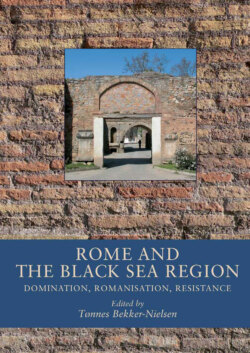Читать книгу Rome and the Black Sea Region - Группа авторов - Страница 7
На сайте Литреса книга снята с продажи.
Romanisation
ОглавлениеAt least since the time of Theodor Mommsen, Romanisierung or ‘Romanisation’ has been used as a convenient catch-all term to describe these changes. Though the term has remained in use for over a century, its content and implications have changed. The historiography of Roman expansion and its consequences offer striking proof of Benedotte Croce’s dictum that in the last analysis “all history is contemporary history”. In the late nineteenth and early twentieth century, Roman expansion in Italy was viewed as a “natural” historical progress analogous to the formation of modern European nation-states; Roman expansion outside Italy as the “natural” domination of a higher race analogous to the formation of the European overseas empires; and Romanisation as the “natural attraction of a higher form of life” (Rostovtzeff 1927). For “Roman”, read Russian, Dutch, British or French; for “barbarian”, read Algerian, Indian, Indonesian, Cossack or African.
To most thinkers of the early twentieth century, even the more profound ones, imperialism was if not justified, at least compensated by the advantages in terms of law, order, morals and religion imposed by the new masters on their willing or unwilling subjects. Continued European domination under “mandated” colonial administration, not self-government, was the League of Nations’ gift to the liberated territories of the vanquished German and Ottoman Empires. The former subjects of the Austrian Empire, on the other hand, were allowed to govern themselves; but then of course they were Europeans.
As with European expansion, the justification of Roman expansion was rarely called into question, and Romanisation was seen to justify Roman dominance or at the very least, as a beneficial spin-off effect of Roman expansion. In the graphic formulation of Francis Haverfield, the Roman empire was an oasis of peace and order; outside its borders “roared the wild chaos of barbarism” (Haverfield 1924).
The comfortable assumptions on which European imperialism was based were already called into question during the inter-war period and definitely shattered by World War II. The breakup of the colonial empires had begun during the war, gained momentum in the 1950s and was largely complete by the mid-sixties. This did not, however, translate into a reappraisal of Roman imperialism. On the contrary, Rostovtzeff’s Rome, firmly rooted in the ideological perceptions of pre-1914 Russian liberalism, was still being reprinted and translated in the 1960’s. To solve this seeming paradox, it needs to be remembered that in its early post-war phase, decolonisation was largely imposed on the European powers by the two new superpowers, both strongly anti-colonialist (though for very different reasons). What eventually made the intellectual establishment of western Europe turn its back on colonialism, however, was the rise of local resistance movements from the mid-1950s onwards, often led by an educated and Europeanised elite who could no longer be dismissed as “barbarians”.
